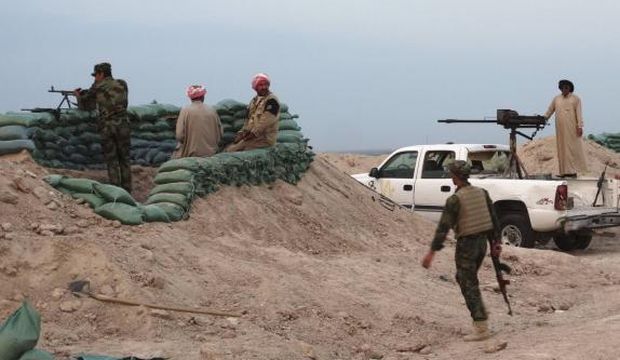
Tribal fighters carry their weapons as they take part in an intensive security deployment against Islamic State of Iraq and Syria (ISIS) militants in the town of Amiriyah Fallujah, in Anbar province, on October 31, 2014. (Reuters/Stringer)
“The arms and ammunition that we possess to fight ISIS will only last us for another five days, after this we will now longer have the capability to continue the fight against ISIS, which possess more sophisticated arms,” Albunimr tribal leader Shiekh Naim Al-Kaoud told Asharq Al-Awsat.
“We have sent messages to Prime Minister Haider Al-Abadi telling him about our situation and asking him either to accelerate our arming or allow us to purchase arms at our own expense and register them with the government. Ultimately, we do not want to be militias,” he added.
Kaoud also commented on the recent visit of an Iraqi tribal delegation to Washington to discuss the latest developments on the ground in the fight against ISIS, as well as calls for Iran to assist Iraqi anti-ISIS efforts, including through the provision of arms. “The Anbar tribes, particularly those that are actually fighting on the ground, did not go to Washington and will not go to Iran. We believe that arming is the responsibility of the [Iraqi] government and state, not foreign parties,” he said.
Mohamed Nasser Al-Karbouli, an MP from Anbar and senior member of the Sunni-backed Iraqiya bloc, told Asharq Al-Awsat that he agreed with Kaoud.
“The issue of arming is the responsibility of the government, but unfortunately it has not done its duty to meet the requirements of the tribes,” he said.
He also downplayed reports that some Anbar tribes had issued statements saying they would look to Iran for arms supplies.
“Those who said this are not Anbar tribal leaders, but some leaders of Awakening groups like Hamid Al-Hais and Wisam Al-Hardan. They do not have the same weight as the Anbar tribes,” he said.
Karbouli, who is Iraq’s former industry minister, denied that the government had little or no presence on the ground in Anbar, following protests in front of the provincial government’s headquarters on Sunday.
“These protests are primarily targeting provincial council chairman Sabah Karhout and not governor Ahmed Al-Dulaimi,” said Karbouli. Dulaimi was seriously wounded in September in the town of Barwana, shortly after it was recaptured from ISIS.
“I do not think that there is any justification for these protests…because the province has not witnessed any administrative vacuum. There are a number of deputy governors who are administrating affairs in this province that has been fighting terrorism for years. Today, it has been fighting ISIS for approximately one year and this is something that cannot take place without an administration in place to coordinate with different political and tribal entities within the province and beyond,” he said.
Large parts of Iraq’s vast Anbar province were overrun by ISIS earlier this year, following the organization’s stunning successes in northern Iraq. The group was assisted in part by the disenchantment of the province’s largely-Sunni population with the central government in Baghdad, previously led by ex-premier Nuri Al-Maliki, which they accused of sectarian bias.

Trackbacks/Pingbacks